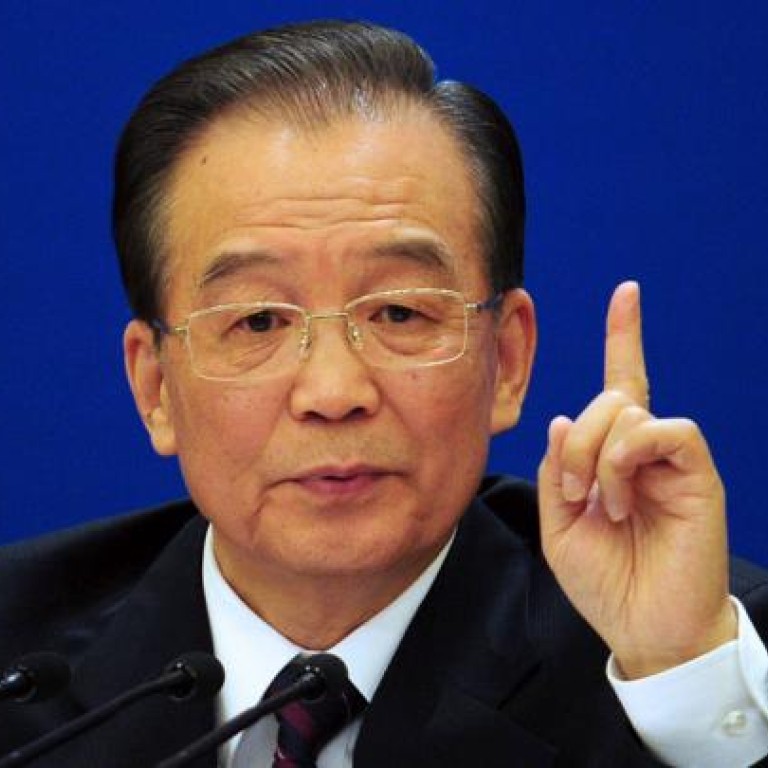
Companies want Beijing to ease tax burden
Beijing has been promising reforms since 2004, and hard-pressed companies are tired of waiting
As the annual session of the National People's Congress and a government reshuffle draw nigh, millions of business executives and wealthy individuals are hoping the new cabinet equates tax reform with tax cuts.
Beijing put forward a tax-cut plan in 2004, using the term "structural tax reform", hoping it could ease the tax burdens on companies and individuals.
However, the cabinet led by outgoing Premier Wen Jiabao adopted a go-slow approach to tax reform because of worries that drastic cuts would leave a big hole in revenue.
That revenue has grown in leaps and bounds in the past decade, in what the government says is an indicator of a buoyant economy, and topped 10 trillion yuan (HK$12.4 trillion) last year, up 12.1 per cent year on year.
"The central government is using all means to chase an overall increase in tax revenue," said Zhang Jiyong, a Shanghai-based auditor. "Businesses are increasingly feeling the pressure from the tax authorities to pay more."
The central government is using all means to chase an overall increase in tax revenue. Businesses are increasingly feeling the pressure from the tax authorities to pay more
Beijing abolished its agricultural tax in 2006, before raising the threshold for personal income tax from 2,000 yuan to 3,500 yuan in September 2011 - two measures to ease the tax burden on individuals.
But the moves failed to stoke domestic demand and boost business activity.
Tax reform presents the government with something of a dilemma, because a tax cut would eat into tax revenue in the short term, but could boost manufacturing and spending in the long run, leading to an increase in overall tax income.
Dozens of business executives surveyed by the complained about structural tax reform, contending that it was an empty promise rather than a substantive incentive.
According to anecdotal evidence, taxation officials have been tightening up on reviews of companies' books since last year in an effort to stamp out evasion.
Thousands of mainland businesses, particularly the small and medium-sized ones, have taken a beating from dwindling overseas orders and rising labour costs since the financial crisis of 2008.
They have been lobbying governments to slash taxes to give them a much-needed boost, but those efforts have been in vain.
"The government keeps harping on its intention to help us, but when it comes down to the tax issue, it never takes action," said one Wenzhou entrepreneur.
Shanghai began a tax-reform pilot scheme at the start of last year aimed at easing the burden on service firms. But a poll by the China Federation of Logistics and Purchasing showed that two-thirds of corporate respondents paid more under the new tax regime.
Before the reform, service firms in Shanghai were subject to a flat business-tax rate, based on their sales. Under the new system, the authorities charge a value-added tax (VAT).
The value of invoices issued by suppliers of raw materials is measured against the value of the sales invoices service companies issue to their customers. The difference between the two is considered to be the "value added".
"There are lots of technical problems with the VAT reform in Shanghai," said Wang Yao, dean of the department of public finance and taxation at Shanghai Lixin University of Commerce. "But the government is determined to expand the programme nationwide."
The State Council expanded the VAT reform to 10 more cities and provinces, including Beijing, Tianjin and Anhui , in August.
Sources said premier-in-waiting Li Keqiang was adamant about the need to fine-tune tax reform measures to help mainland businesses.
"We need real tax benefits," said Han Haifeng, the owner of a printing firm. "Whatever the new system turns out to be, we just want to get one result - lower tax payments."
Businesspeople had one reason to cheer after new party chief Xi Jinping ordered ministries to cut back on waste and shun extravagant meals.
"As the officials cut lavish spending, they might not feel so desperate to boost government coffers," Zhang said. "That's good news for taxpayers."

